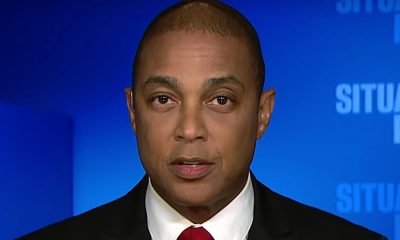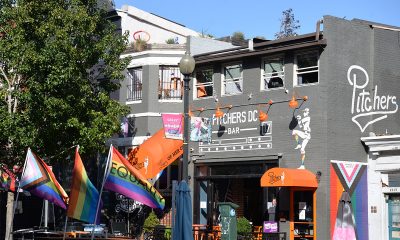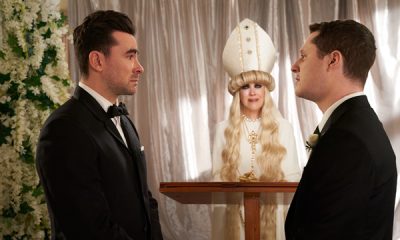Local
Probable cause found that off-duty cop fired gun at trans women
Judge orders D.C. officer held without bond
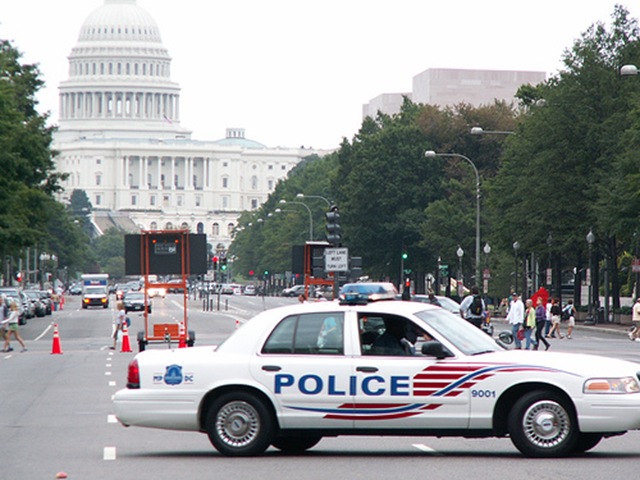
A D.C. Superior Court judge on Sept. 2 ruled that prosecutors established probable cause that an off-duty D.C. police officer committed an assault with a dangerous weapon for allegedly firing a pistol at three transgender women and two male friends during an Aug. 26 incident in Northwest Washington.
Judge Ann O’Regan Keary ordered Officer Kenneth Furr, a 21-year veteran on the force, held without bond pending his trial. Keary said evidence presented by police and prosecutors showed that releasing the officer would pose a danger to the community.
The judge’s ruling came during a preliminary hearing in which First District police Det. James Freeman provided detailed testimony about his investigation of the incident.
Freeman testified that the victims and at least two D.C. police officers who were in the vicinity of the shooting reported that Furr stood on the hood of a car in which the victims were sitting and fired at them through the windshield.
He said witnesses and the victims reported that the incident began about 4:40 a.m. at a CVS drug store at 400 Massachusetts Ave., N.W., when Furr and one of the shooting victims reportedly got into a “verbal altercation.”
Transgender activist Jeri Hughes said one of the transgender women involved in the incident told her the verbal altercation inside the CVS store started when Furr approached one of the transgender women and invited her to engage in sex. Furr reportedly became angry when she turned him down, Hughes said, prompting the woman’s male friend to exchange words with Furr in an effort to get him to leave the woman alone.
Freeman testified that Furr and the same person who argued with Furr inside the CVS store exchanged words outside the store a short time later while Furr was sitting in his car parked nearby.
According to Freeman, Furr reportedly retrieved a handgun from the glove compartment of his car, pointed it at the person and threatened to shoot the person, who is believed to be one of the male friends of the trans women.
The same person returned to the CVS store and told a security guard that Furr had threatened him with a gun, a police affidavit says. The victim then met up with the other four people, including the three transgender women, and all five got into one of their cars and followed Furr, who drove away in his car, Freeman testified.
When both cars reached the intersection of First and Pierce streets, N.W., Furr jumped out of his car and began to shoot at the car where the five others were riding, Freeman told the court hearing. The shooting prompted the driver to crouch down to avoid being hit, causing the car he was driving to collide with Furr’s car, Freeman said.
That’s when Furr apparently climbed on the hood of the other car and fired his gun through the windshield, the victims and police witnesses reported.
Police and transgender activists who spoke with at least two of the victims said two of three transgender women in the car suffered non-life threatening gunshot wounds during the incident. Transgender activists said one of two male friends who were in the car was also was struck and suffered serious but non-life threatening wounds. All three were treated in area hospitals, the activists said.
In his testimony at the Sept. 2 hearing Freeman recounted details from a police affidavit he prepared that lists each of the five people in the car as unidentified witnesses. Neither the affidavit nor Freeman during his court testimony mentioned that three of the five people in the car at which Furr allegedly fired his gun were members of the transgender community.
News that some of the victims were members of the transgender community emerged from a police news release on the day of the incident. Deputy D.C. Police Chief Diane Groomes made personal calls to LGBT activists shortly after 5 a.m. on Aug. 26, just minutes after the incident occurred, to inform them of what happened and to note that police and the department’s Gay and Lesbian Liaison Unit were investigating the incident.
Assistant U.S. Attorney Lara Worm argued at the court hearing that police provided sufficient evidence that probable cause exists that Furr committed an assault with a dangerous weapon two times – once when he pointed the gun at one or two of the victims outside the CVS store and another time when he fired his gun at the victims while they were in their car.
Furr’s defense attorney, Harold Martin, told Keary accounts of the incident by various witnesses appeared to differ, making it difficult to determine the events that led to the shooting. He noted that the car in which the five people were riding followed Furr in the “wee hours of the morning” and Furr had a legal right to defend himself if he believed he was in danger.
He also pointed to the police affidavit’s assertion that one of the victims admitted to being drunk at the time of the incident and another victim admitted to having smoked marijuana the night prior to the incident.
“There are a lot of unanswered questions about what happened that night,” he said.
“The defendant exhibited extremely reckless behavior,” Worm told the judge. “He shot at least five times and certainly all five could have been killed.”
She pointed to a statement by at least one of the victims that Furr shouted “Ima kill all of you” before he started shooting into the vehicle.
Worm noted a police breadth test also found that Furr “had been drinking a substantial amount of alcohol” and that he had a prior arrest in D.C. for driving while intoxicated. Police initially charged Furr with driving while intoxicated in the latest incident but the U.S. Attorney’s office did not file that charge in court.
Nearly a dozen family members and friends of Furr’s sat in the courtroom during the hearing, a fact that defense attorney Martin mentioned while arguing that Furr’s strong community ties were among the grounds for allowing him to be released while awaiting trial.
But Keary, in issuing her ruling on the matter, said the government met the legal criteria needed to have Furr held in jail, saying no combination of circumstances or mitigating factors could override her belief that Furr would pose a danger to the public if released.
She scheduled a status hearing for Oct. 7. The case was expected to go before a grand jury in the next few weeks.
Maryland
4th Circuit dismisses lawsuit against Montgomery County schools’ pronoun policy
Substitute teacher Kimberly Polk challenged regulation in 2024

A federal appeals court has ruled Montgomery County Public Schools did not violate a substitute teacher’s constitutional rights when it required her to use students’ preferred pronouns in the classroom.
The 4th U.S. Circuit Court of Appeals in a 2-1 decision it released on Jan. 28 ruled against Kimberly Polk.
The policy states that “all students have the right to be referred to by their identified name and/or pronoun.”
“School staff members should address students by the name and pronoun corresponding to the gender identity that is consistently asserted at school,” it reads. “Students are not required to change their permanent student records as described in the next section (e.g., obtain a court-ordered name and/or new birth certificate) as a prerequisite to being addressed by the name and pronoun that corresponds to their identified name. To the extent possible, and consistent with these guidelines, school personnel will make efforts to maintain the confidentiality of the student’s transgender status.”
The Washington Post reported Polk, who became a substitute teacher in Montgomery County in 2021, in November 2022 requested a “religious accommodation, claiming that the policy went against her ‘sincerely held religious beliefs,’ which are ‘based on her understanding of her Christian religion and the Holy Bible.’”
U.S. District Judge Deborah Boardman in January 2025 dismissed Polk’s lawsuit that she filed in federal court in Beltsville. Polk appealed the decision to the 4th Circuit.
District of Columbia
Norton hailed as champion of LGBTQ rights
D.C. congressional delegate to retire after 36 years in U.S. House
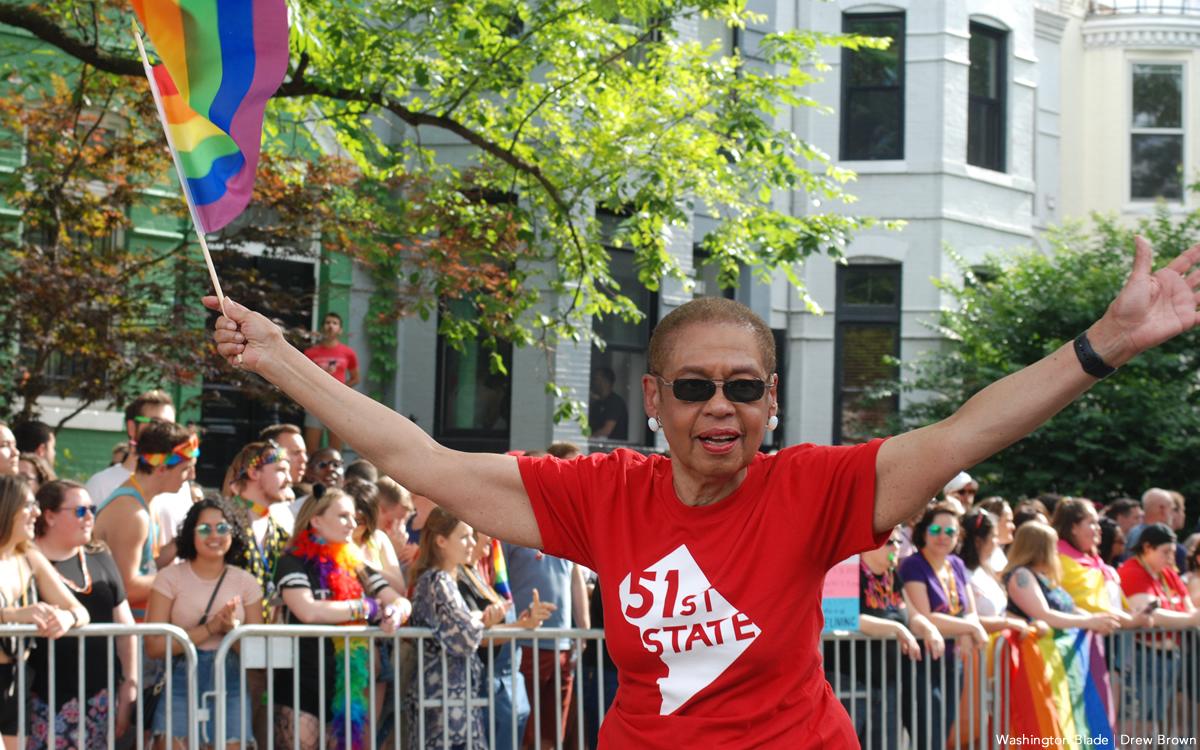
LGBTQ rights advocates reflected on D.C. Congressional Del. Eleanor Holmes Norton’s longstanding advocacy and support for LGBTQ rights in Congress following her decision last month not to run for re-election this year.
Upon completing her current term in office in January 2027, Norton, a Democrat, will have served 18 two-year terms and 36 years in her role as the city’s non-voting delegate to the U.S. House.
LGBTQ advocates have joined city officials and community leaders in describing Norton as a highly effective advocate for D.C. under the city’s limited representation in Congress where she could not vote on the House floor but stood out in her work on House committees and moving, powerful speeches on the House floor.
“During her more than three decades in Congress, Eleanor Holmes Norton has been a champion for the District of Columbia and the LGBTQ+ community,” said David Stacy, vice president of government affairs for the Human Rights Campaign, the D.C.-based national LGBTQ advocacy organization.
“When Congress blocked implementation of D.C.’s domestic partnership registry, Norton led the fight to allow it to go into effect,” Stacey said. “When President Bush tried to ban marriage equality in every state and the District, Norton again stood up in opposition. And when Congress blocked HIV prevention efforts, Norton worked to end that interference in local control,” he said.
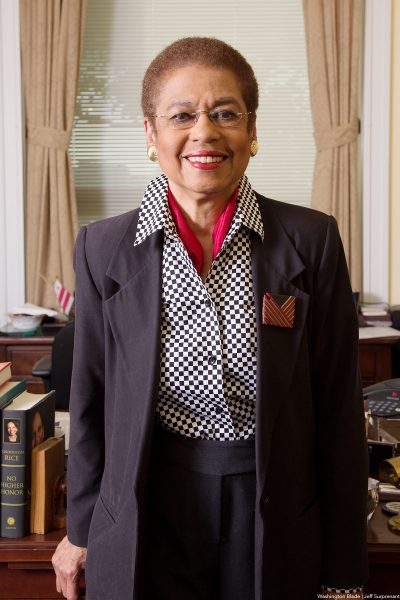
In reflecting the sentiment of many local and national LGBTQ advocates familiar with Norton’s work, Stacy added, “We have been lucky to have such an incredible champion. As her time in Congress comes to an end, we honor her extraordinary impact in the nation’s capital and beyond by standing together in pride and gratitude.”
Norton has been among the lead co-sponsors and outspoken supporters of LGBTQ rights legislation introduced in Congress since first taking office, including the currently pending Equality Act, which would ban employment discrimination based on sexual orientation and gender identity.
Activists familiar with Norton’s work also point out that she has played a lead role in opposing and helping to defeat anti-LGBTQ legislation. In 2018, Norton helped lead an effort to defeat a bill called the First Amendment Defense Act introduced by U.S. Sen. Mike Lee (R-Utah), which Norton said included language that could “gut” D.C.’s Human Rights Act’s provisions banning LGBTQ discrimination.
Norton pointed to a provision in the bill not immediately noticed by LGBTQ rights organizations that would define D.C.’s local government as a federal government entity and allow potential discrimination against LGBTQ people based on a “sincerely held religious belief.”
“This bill is the latest outrageous Republican attack on the District, focusing particularly on our LGBT community and the District’s right to self-government,” Norton said shortly after the bill was introduced. “We will not allow Republicans to discriminate against the LGBT community under the guise of religious liberty,” she said. Records show supporters have not secured the votes to pass it in several congressional sessions.
In 2011, Norton was credited with lining up sufficient opposition to plans by some Republican lawmakers to attempt to overturn D.C.’s same-sex marriage law, that the Council passed and the mayor signed in 2010.
In 2015, Norton also played a lead role opposing attempts by GOP members of Congress to overturn another D.C. law protecting LGBTQ students at religious schools, including the city’s Catholic University, from discrimination such as the denial of providing meeting space for an LGBTQ organization.
More recently, in 2024 Norton again led efforts to defeat an attempt by Republican House members to amend the D.C. budget bill that Congress must pass to eliminate funding for the Mayor’s Office of LGBTQ Affairs and to prohibit the city from using its funds to enforce the D.C. Human Rights Act in cases of discrimination against transgender people.
“The Republican amendment that would prohibit funds from being used to enforce anti-LGBTQ+ discrimination regulations and the amendment to defund the Mayor’s Office of LGBTQ+ Affairs are disgraceful attempts, in themselves, to discriminate against D.C.’s LGBTQ+ community while denying D.C. residents the limited governance over their local affairs to which they are entitled,” Norton told the Washington Blade.
In addition to pushing for LGBTQ supportive laws and opposing anti-LGBTQ measures Norton has spoken out against anti-LGBTQ hate crimes and called on the office of the U.S. Attorney for D.C. in 2020 to more aggressively prosecute anti-LGBTQ hate crimes.
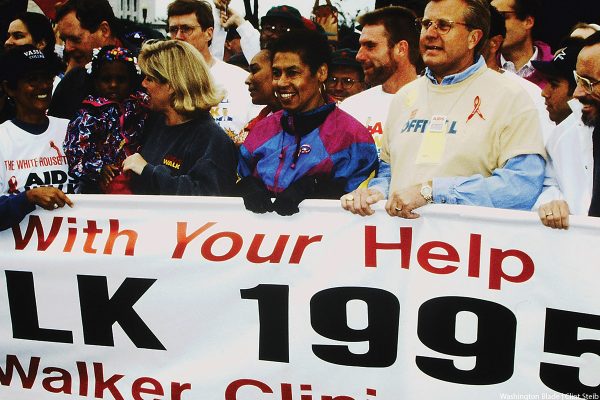
“There is so much to be thankful for Eleanor Holmes Norton’s many years of service to all the citizens and residents of the District of Columbia,” said John Klenert, a member of the board of the LGBTQ Victory Fund. “Whether it was supporting its LGBTQ+ people for equal rights, HIV health issues, home rule protection, statehood for all 700,000 people, we could depend on her,” he said.
Ryan Bos, executive director of Capital Pride Alliance, the group that organizes D.C.’s annual LGBTQ Pride events, called Norton a “staunch” LGBTQ community ally and champion for LGBTQ supportive legislation in Congress.
“For decades, Congresswoman Norton has marched in the annual Capital Pride Parade, showing her pride and using her platform to bring voice and visibility in our fight to advance civil rights, end discrimination, and affirm the dignity of all LGBTQ+ people” Bos said. “We will be forever grateful for her ongoing advocacy and contributions to the LGBTQ+ movement.”
Howard Garrett, president of D.C.’s Capital Stonewall Democrats, called Norton a “consistent and principled advocate” for equality throughout her career. “She supported LGBTQ rights long before it was politically popular, advancing nondiscrimination protections and equal protection under the law,” he said.
“Eleanor was smart, tough, and did not suffer fools gladly,” said Rick Rosendall, former president of the D.C. Gay and Lesbian Activists Alliance. “But unlike many Democratic politicians a few decades ago who were not reliable on LGBTQ issues, she was always right there with us,” he said. “We didn’t have to explain our cause to her.”
Longtime D.C. gay Democratic activist Peter Rosenstein said he first met Norton when she served as chair of the New York City Human Rights Commission. “She got her start in the civil rights movement and has always been a brilliant advocate for equality,” Rosenstein said.
“She fought for women and for the LGBTQ community,” he said. “She always stood strong with us in all the battles the LGBTQ community had to fight in Congress. I have been honored to know her, thank her for her lifetime of service, and wish her only the best in a hard-earned retirement.”
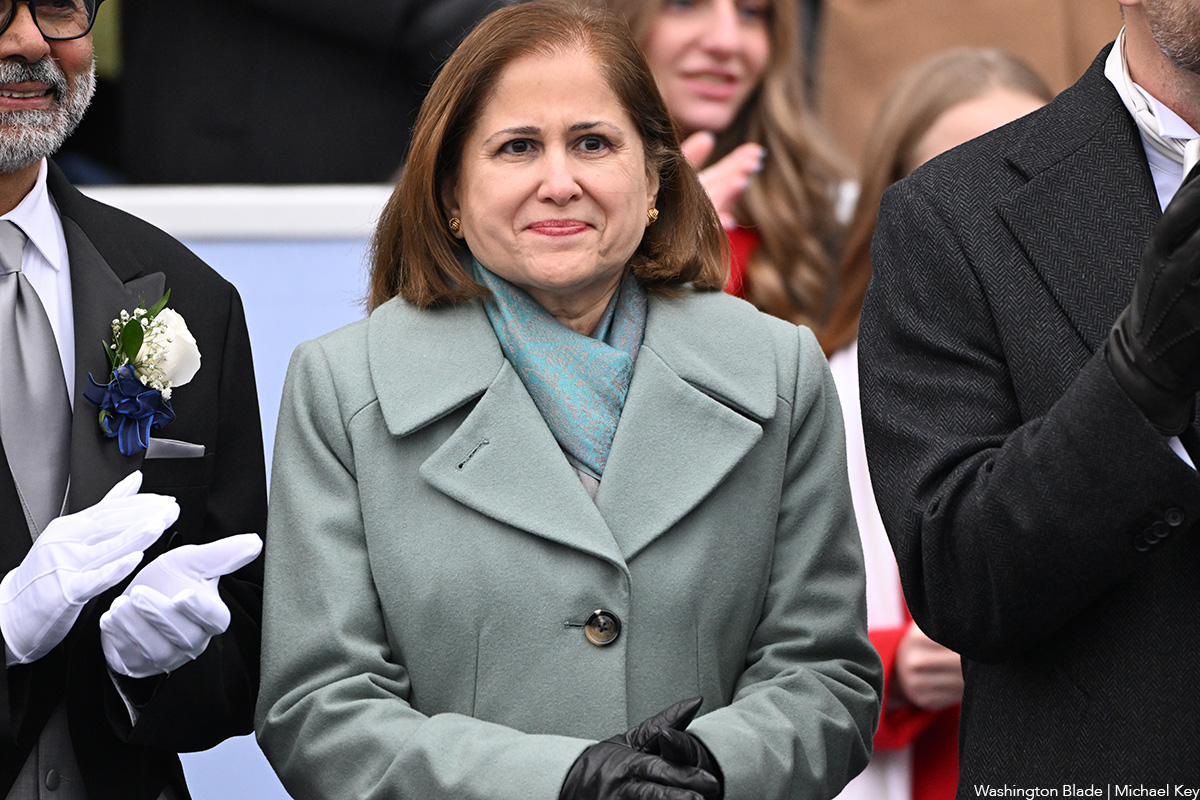
Lieutenant Gov. Ghazala Hashmi on Monday opened Equality Virginia’s annual Lobby Day in Richmond.
The Lobby Day was held at Virginia’s Capitol and was open to the public by RSVP. The annual event is one of the ways that Equality Virginia urges its supporters to get involved. It also offers informational sessions and calls to action through social media.
Hashmi, a former state senator, has been open about her support for the LGBTQ community and other marginalized groups. Her current advisor is Equality Virginia Executive Director Narissa Rahaman, and the group endorsed her for lieutenant governor.
Hashmi historically opposes anti-transgender legislation.
She opposed a 2022 bill that sought to take away opportunities from trans athletes.
One of the focuses of this year’s Lobby Day was protecting LGBTQ students. Another was protecting trans youth’s access to gender-affirming care.
Advocates spent their day in meetings and dialogues with state legislators and lawmakers about legislative priorities and concerns.
-

 National4 days ago
National4 days agoFederal authorities arrest Don Lemon
-

 a&e features4 days ago
a&e features4 days agoD.C. LGBTQ sports bar Pitchers listed for sale
-

 Florida4 days ago
Florida4 days agoAIDS Healthcare Foundation sues Fla. over ‘illegal’ HIV drug program cuts
-

 Arts & Entertainment4 days ago
Arts & Entertainment4 days agoCatherine O’Hara, ‘Schitt’s Creek’ star and celebrated queer ally, dies at 71
















